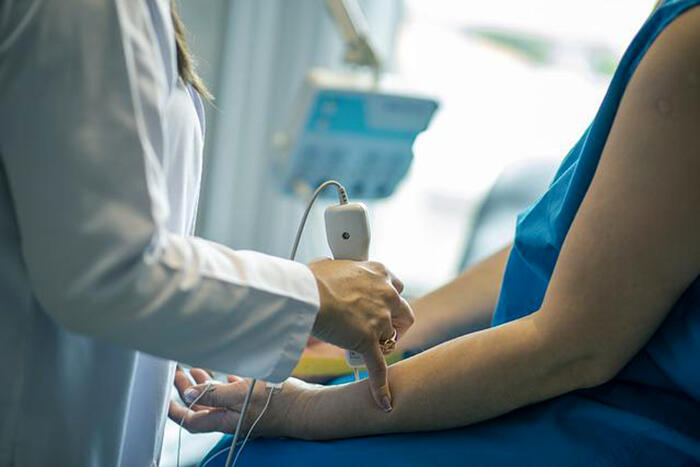
How will the Japan Agency for Medical Research and Development (AMED) ensure stricter selection and stronger areas of focus in next year's budget? The agency has clarified its resource allocation policy for the research and development budget for the medical field, working toward next year's budget appropriation request. The Headquarters for Healthcare Policy will make a decision soon.
Among AMED's six integrated projects, the Project for Advanced Drug Discovery and Development will engage in research using new technology and development techniques, promoting conventional research in connection with the development of pharmaceuticals for cancer as well as drug discovery for cancer treatments that use medical RI (radio isotopes), so as to strengthen the foundation for technical support and strategic research and development based on unmet medical needs; it will also focus on prediction methods through 3D simulations that use the supercomputer Fugaku, and on developing mass synthesis technology and structure analysis technology based on corporate needs in connection with RNA target drug discovery. In terms of regulatory science, the project will engage in the development of a next-generation international standard evaluation method with the aims of updating quality testing for radiopharmaceuticals and ensuring the rapid dissemination of medical equipment. Although there is strong need for medical treatments for infants and rare diseases, there is no expectation of profit, so the project will encourage clinical research in fields where there is no corporate development. When it comes to measures for emerging and reemerging infectious diseases, the project will promote the development of pharmaceuticals such as vaccinations and therapeutic drugs, the clarification of pathological mechanisms, and research and development needed for important measures in public health risk management, such as saving lives, epidemic control and maintaining social activities during a serious infection, including COVID-19.
The Project for Medical Device and Healthcare will support the development of innovative medical devices based on newly established fields of emphasis and medical devices that will help relieve burdens on healthcare providers through the Second Basic Plan for Medical Devices. It will also support the development of medical devices that Japan is highly reliant on foreign countries for and are needed for measures against infection. When it comes to cancer, the project will predominantly promote clinical research aiming to put class III and IV medical devices to practical use; with regard to lifestyle diseases, it will promote the development of device software for prevention, early detection and disease risk assessments.
In the Project for Regenerative / Cellular Medicine and Gene Therapies' the Research Center Network for Realization of Regenerative Medicine, which is to finish this fiscal year, will engage in strengthening innovative basic research through research that combines regenerative/cellular medicine and gene therapies, promoting disease iPS cell research and reverse translational research (rTR), and ensuring full accompanying support for regulations for implementation and handling intellectual property, so it doesn't lose any of the strengths it has accumulated until now. It will also expand the scope of its support through clinical research support projects, which was limited to regeneration and cellular medicine, to include in vivo gene therapies. Moreover, it will promote the construction of a framework to support production development and clinical development in the gene therapies area.
Based on the Whole Genome Analysis Implementation Plan, the Project for Genome and Health Related Data will construct built-in information infrastructure that will connect clinical information and information about whole genome analysis results to promote drug discovery connected to cancer and incurable diseases, and will rapidly create an environment connected to its use and application. When it comes to transplants, mental illnesses, dementia, hepatitis, growth, and the lifestyle diseases area, the project will also promote the clarification of pathologies through the construction and enhancement of databases and their use, and research for the development of feasible prevention, diagnostic and treatment methods. While the project is already cooperating with data infrastructure in Japan, it will go ahead with the construction of collaborative infrastructure with guaranteed security that will allow third parties, including the world of industry, to use research and development data created by AMED projects that is subject to quality control.
The Project for Basic Medical Research will promote research that will contribute to future infection countermeasures through the fusion of multiple fields, international networks in overseas bases and their use, including strengthening monitoring functions. It will ensure mutual collaboration in research and development to clarify brain functions, and in projects associated with training for young people and the fusion of different fields, working toward overcoming mental and neurological illnesses. With regard to cancer, it will promote research that contributes to assigning clinical significance to genetic abnormalities, including untranslated regions, through the use of whole genome/clinical data, and the development of seeds for new medical treatments, as well as risk stratification based on pathologic mechanisms and the identification of new medical targets in lifestyle diseases. In terms of immunology and allergic diseases, the project will encourage research that will lead to the clarification of pathological causes and conditions in response to the Strategic Outlook toward 2030: Japan's research for allergy and immunology, as well as basic research connected to hepatic cancer, with regard to hepatitis and other diseases.
The Project for Seeds Development and Research Base will use the high-quality support functions of intermediary research support institutions certified by the Minister of Education, Culture, Sports, Science and Technology to accelerate continuing implementation in medical treatment through seamless support for seeds and the enhancement of industry-academic collaboration. It will aim to encourage the implementation of innovative technologies that take advantage of the characteristics of core clinical research hospitals, and to construct a foundation for the implementation of clinical trials for emerging and reemergent diseases. It will also continue basic research on the creation and nurturing of ground-breaking seeds, and the promotion of joint international research and international collaboration.
This article has been translated by JST with permission from The Science News Ltd.(https://sci-news.co.jp/). Unauthorized reproduction of the article and photographs is prohibited.




